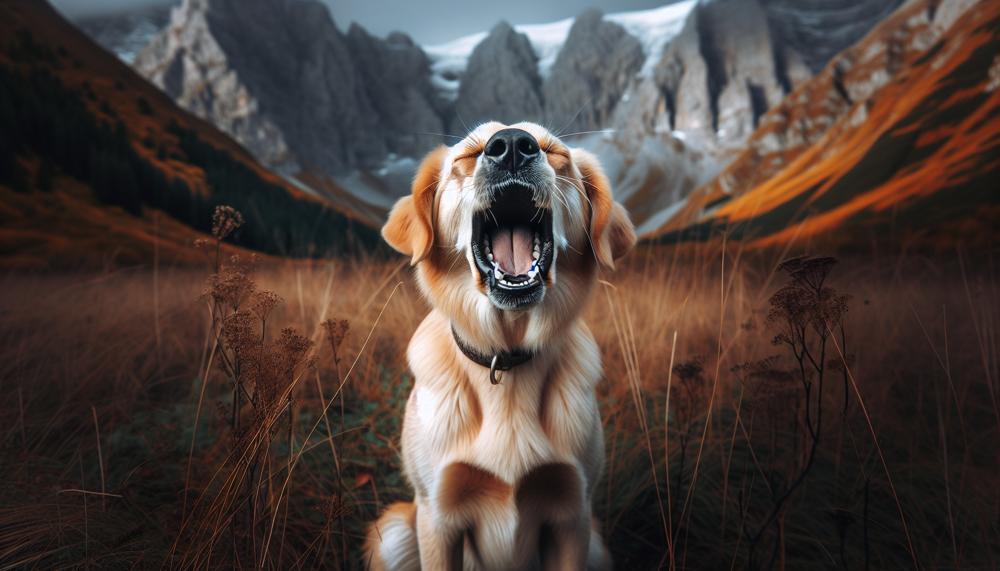Have you ever heard your four-legged companion make a snorting sound like a pig? It may have left you scratching your head and wondering, why does my dog grunt like a pig?
Many pet owners have pondered the reasons behind this peculiar behavior. It is quite common among dogs. But fear not, for we have done our research and uncovered the truth behind this curious canine habit.
So sit back, relax, and prepare to learn all about why dogs grunt like pigs with these key insights:
- Grunting is a natural form of communication for our furry friends.
- It can convey various emotions such as contentment, frustration, or even pain.
- Certain breeds are more prone to grunting than others.
- Puppies often grunt while playing or when seeking attention from their mother.
- Older dogs may grunt due to age-related health issues.
- Some dogs may also use grunting as a way to assert dominance or submission in social situations.
- Grunting can also be a learned behavior from other animals or humans in the household.
So the next time your beloved pup lets out a snort or two, don’t be alarmed. It’s simply their way of expressing themselves.
Now let’s delve deeper into the fascinating world of dog grunts and uncover the true meaning behind this unique form of communication.
Understanding dog vocalizations
Table of Contents
- 1 Understanding dog vocalizations
- 2 Possible reasons for my dog grunting like a pig
- 3 Breathing issues in dogs
- 4 Gastrointestinal problems
- 5 Muscle and joint pain
- 6 Behavioral issues and stress
- 7 Snorting vs. grunting
- 8 When to seek veterinary attention
- 9 Diagnostic tests for grunting dogs
- 10 Treatment options for grunting dogs
- 11 Conclusion
Dogs can sometimes emit grunts similar to pigs for a multitude of reasons. These include discomfort or pain, stress, respiratory or gastrointestinal issues, or behavioral problems.
In some cases, diagnostic tests may be required to pinpoint the root cause of the grunting. Treatment options will vary based on the specific issue at hand.
Possible reasons for my dog grunting like a pig
Dogs may emit pig-like grunting sounds due to several possible reasons. These may include health issues, discomfort, stress, and behavior problems. Let’s delve deeper into each of these potential causes.
Health Issues:
Dogs may grunt due to health problems. These may include breathing difficulties, gastrointestinal issues, muscle and joint pain, and stress or anxiety.
Certain breeds, like bulldogs or pugs with their short snouts, may be more susceptible to breathing difficulties. Gastrointestinal issues, like bloating or constipation, can also make dogs grunt.
Additionally, muscle and joint pain can cause discomfort and make it challenging for dogs to move, leading to grunting noises.
If your furry friend is frequently grunting or appears to be in pain, seek advice from a veterinarian. It is crucial for a proper diagnosis and treatment.
Discomfort:
Dogs may also grunt when they feel uncomfortable or are experiencing some form of discomfort. This could be caused by an awkward sleeping position, feeling too hot or cold, or even experiencing skin irritation, causing itchiness.
If your dog seems to grunt more at night while attempting to sleep, it might be worth checking for any underlying sources of discomfort.
Stress/Anxiety:
Stress or anxiety can also cause dogs to emit grunting sounds. This can be due to separation anxiety, changes in routine or environment, or fear of specific situations or objects.
If your dog displays other signs of stress and anxiety such as pacing, panting, or destructive behavior, it is essential to address these underlying issues and create a calm and secure environment for your furry companion.
Behavior Problems:
In some instances, grunting in dogs can be a sign of behavior problems. This may include attention-seeking behavior or learned behaviors from past experiences.
It is critical to observe your dog’s body language and vocalizations. This will help you understand the root cause of their grunting. You can address any behavioral issues with the help of a professional trainer or behaviorist.
Breathing issues in dogs
Dogs can have breathing issues from common causes. These include respiratory infections, allergies, anatomical abnormalities, and underlying health conditions.
A veterinary professional can detect these issues through a comprehensive physical examination. Treatment may include medication, surgical intervention, or avoiding allergens.
Pet caregivers must be knowledgeable about potential causes. They should seek appropriate care for their beloved canines to ensure their health and happiness.
Gastrointestinal problems

Gastrointestinal problems are a common issue among dogs that can cause them to snort and grunt like a pig.
These problems can stem from various factors, such as dietary indiscretion, food allergies or sensitivities, medical conditions, or age-related changes.
When faced with discomfort and excessive gas production, dogs may grunt in an attempt to alleviate the discomfort.
Consulting with a veterinarian is crucial for accurate diagnosis and treatment, ensuring the overall health and well-being of your furry friend.
- Dietary indiscretion refers to the consumption of inappropriate or unknown food items, leading to digestive upset in dogs. This can result in an upset stomach, causing them to grunt and snort while trying to release the built-up gas.
- Similarly, food allergies or sensitivities can also trigger gastrointestinal problems in dogs. These allergies can be caused by specific ingredients in their diet, leading to discomfort and excessive gas production.
- Furthermore, medical conditions such as pancreatitis or inflammatory bowel disease (IBD) can also cause gastrointestinal problems in dogs. These conditions can cause inflammation in the digestive tract, leading to discomfort and abdominal pain, resulting in grunting and snorting. As dogs age, they may also experience changes in their gastrointestinal system, making them more prone to digestive issues.
If your dog is exhibiting signs of gastrointestinal problems such as grunting and snorting, it is important to consult with a veterinarian for proper diagnosis and treatment.
Neglecting these issues can lead to further complications and affect your dog’s overall well-being.
Remember to always pay attention to your dog’s behavior and seek professional help if necessary.
Muscle and joint pain
Dogs, like humans, can experience muscle and joint pain for a variety of reasons. The causes may include developmental or degenerative joint issues, injuries, or underlying medical conditions.
It’s essential to identify the root cause of your dog’s discomfort to provide them with effective relief.
Developmental Joint Issues
Some dogs are born with genetic predispositions to joint problems, such as hip or elbow dysplasia. These conditions can cause significant pain and discomfort and are more common in certain breeds.
When purchasing a dog, it’s crucial to inquire about any potential genetic issues from the breeder.
Degenerative Joint Issues
As dogs age, repeated use of their joints can lead to degenerative conditions like osteoarthritis.
While this condition is more prevalent in older dogs, it can also occur in younger dogs who have had previous injuries or underlying medical conditions.
Injuries
Accidents or overexertion during exercise can result in muscle or joint injuries in dogs.
These injuries can cause pain and discomfort and should be treated promptly.
Underlying Medical Conditions
Certain medical conditions, such as Lyme disease or hypothyroidism, can cause muscle and joint pain in dogs.
It’s crucial to consult with a veterinarian for proper diagnosis and treatment.
To alleviate your dog’s discomfort caused by muscle and joint pain, consider the following suggestions:
Consult with a Veterinarian
Seeking advice from a veterinarian is essential when dealing with your dog’s muscle and joint pain.
They can provide an accurate diagnosis and recommend appropriate medication or therapy based on the severity of the condition.
Surgery
In some cases, surgery may be necessary to correct developmental issues like hip or elbow dysplasia that are causing joint pain.
Nutrition and Exercise
Maintaining healthy joints in dogs requires proper nutrition and exercise.
Your veterinarian may suggest a specific diet and exercise plan tailored to your dog’s needs.
Rehabilitation and Physical Therapy
Rehabilitation and physical therapy can be beneficial in managing muscle and joint pain in dogs.
Techniques like massage, hydrotherapy, or laser therapy may help alleviate discomfort.
Weight Management
Maintaining a healthy weight is crucial for dogs with joint pain as excess weight can add strain to already painful joints.
Your veterinarian can recommend a suitable diet and exercise plan to help your dog maintain a healthy weight.
Behavioral issues and stress
The grunting of a dog, much like a pig, can be attributed to various factors such as stress and behavioral issues. These vocalizations can be a result of anxiety or fear. They are often caused by changes in routine, loud noises, or unfamiliar environments. Additionally, fear or aggression may also cause grunting vocalizations. Other behavioral issues may also be the cause.
Stress and anxiety can also have physical implications on dogs, causing muscle tension and pain. In such cases, grunting may be a way for dogs to express discomfort or seek attention. Dog owners should pay attention to their pet’s body language. If they notice frequent grunting or signs of pain, they should seek veterinary care.
Moreover, underlying health issues can also contribute to a dog’s grunting. Respiratory problems, gastrointestinal issues, and muscle and joint pain can all cause this behavior. Owners should regularly monitor their dog’s health. They should seek medical attention if they notice any changes in behavior or vocalizations.
To alleviate stress and behavioral issues in dogs, owners must provide a safe and comfortable environment for their pets. This includes establishing a consistent routine. It also means providing ample exercise and mental stimulation. Seek professional help for any underlying behavioral issues.
Snorting vs. grunting
Dogs can make pig-like noises, such as snorting and grunting. However, these sounds have different origins and implications.
Snorting refers to a sudden and forceful release of air through the nose. Grunting is a deep, throaty noise produced by vocal cord vibrations. These noises can occur due to various reasons. These include shorter airways, throat irritation, reverse sneezing, or even excitement and affection.
However, they can also indicate underlying health problems. These problems require prompt attention from a veterinarian.
It is crucial for dog owners to differentiate between snorting and grunting. They can then provide proper care for their beloved companions and seek necessary medical intervention when needed.
It is quite common for dogs to make snorting or grunting sounds, and many owners may dismiss them as normal behavior. However, it is essential to pay attention to the frequency and context of these noises.
- Snorting can be a result of shorter airways or throat irritation, which can lead to difficulty in breathing or swallowing. If this persists, it could be a sign of an underlying respiratory issue that requires immediate medical attention.
- Similarly, grunting can indicate problems with the vocal cords or other issues like inflammation or infection in the throat. In some cases, it may even be a symptom of more severe conditions like laryngeal paralysis or brachycephalic airway syndrome.
In conclusion, snorting and grunting are two common noises that dogs make, but they have different causes and meanings. It is crucial for dog owners to understand the difference between these noises and monitor their frequency and context in order to provide proper care for their furry friends.
When to seek veterinary attention
If your canine companion is frequently or excessively emitting sounds similar to pig grunts, it is advisable to consult a veterinarian for further evaluation. Here are some scenarios where seeking veterinary attention for your dog’s grunting is necessary:
- If your dog suddenly starts grunting and displays signs of respiratory distress, such as difficulty breathing, rapid breathing, or bluish gums.
- If your dog has been grunting like a pig for an extended period of time (more than a few days) with no signs of improvement.
- If your dog has a history of respiratory problems or conditions, such as allergies, brachycephalic syndrome, or laryngeal paralysis.
- If your dog’s grunting is accompanied by other concerning symptoms, including coughing, sneezing, nasal discharge, lethargy, or loss of appetite.
- If you suspect that your dog may have inhaled an object or substance that could be causing irritation or obstruction in their airway.
- If your dog’s grunting is triggered by specific activities, such as exercise, eating, drinking, or being on a leash.
- If you notice any changes in your dog’s behavior, energy levels, or overall health in addition to their grunting.
It is essential to note that while grunting can sometimes be a normal behavior in dogs, it can also be a sign of an underlying health issue that requires attention.
It is always better to err on the side of caution and seek veterinary attention if you have any concerns about your furry friend’s grunting. Early detection and treatment can significantly improve the chances of a successful recovery.
Diagnostic tests for grunting dogs
There are multiple standard diagnostic tests that can assist in determining the underlying cause of a dog’s grunting. These include physical examinations, blood work and urine analysis, imaging tests, endoscopy, and biopsies.
| Test Name | Description | Purpose |
| Physical Examination | A comprehensive evaluation of the dog’s body, including vital signs and any abnormalities. | To identify potential sources of pain or abnormalities that could be contributing to the grunting. |
| Blood Work and Urine Analysis | Analyzing blood and urine samples for any underlying health conditions or infections. | To uncover any potential health concerns and provide insight into overall health and organ function. |
| Imaging Tests (X-rays and Ultrasounds) | Capturing images of the dog’s body to detect any structural abnormalities or injuries. | X-rays can reveal bone fractures or joint problems, while ultrasounds provide detailed images of soft tissue structures. |
| Endoscopy | Utilizing a miniature camera to examine the inside of the dog’s body. | To obtain a closer look at any potential issues in the digestive tract or respiratory system. |
| Biopsies | Taking small tissue samples from abnormal areas for microscopic analysis. | To determine the cause of any abnormalities found during other tests. |
These tests may not be necessary for every grunting dog. However, they can provide valuable insight for proper diagnosis and treatment.
Treatment options for grunting dogs
When your furry friend starts grunting like a pig, it’s important to take action.
It’s crucial to understand that grunting is not a normal behavior in dogs and can be an indication of an underlying health issue.
Seeking veterinary attention is a vital step in addressing this concern.
A thorough physical examination and diagnostic tests can help identify the root cause of your dog’s grunting. This allows for targeted treatment to improve their overall health and well-being.
Paying attention to your dog’s vocalizations and behavior can also provide valuable insights into their needs and help you provide appropriate care.
It’s essential to understand the different types of vocalizations, such as snorting and grunting, to identify potential health concerns. Some common causes of grunting in dogs include pain, fear, or other health issues.
By distinguishing between these vocalizations, you can quickly recognize any potential issues and seek proper treatment.
Once the underlying cause of your dog’s grunting has been identified, treatment options can be determined. Treatment based on the underlying issue provides targeted care. It addresses the specific problem causing the grunting. Along with proper medical treatment, providing plenty of love and care can greatly improve your dog’s overall well-being and comfort.
It’s crucial to note that avoiding repetitive sentence structure and word usage is essential when rewriting content. Varying sentence length and structure can make the content more engaging for readers.
In summary, seeking veterinary attention and understanding vocalizations and behavior can help. Identifying different types of vocalizations, knowing potential causes, and providing love and care are also effective treatment options for dogs who grunt like pigs. Refer to the table below for a quick overview of these options and their benefits.
Conclusion
In conclusion, the grunting behavior of dogs closely resembles that of pigs. It’s a natural and complex form of communication. It serves as a way for our canine companions to express various emotions. They may show contentment, frustration, or even pain. This behavior is more commonly observed in certain breeds. Puppies seek attention from their mother. Older dogs seek attention due to age-related health issues.
Interestingly, some dogs may also use grunting as a means of asserting dominance or submission in social situations. Others may learn it from other animals or humans in the household.
However, it’s important to note that grunting can also be a sign of underlying health issues. These include respiratory problems, gastrointestinal issues, muscle and joint pain, stress or anxiety, and behavioral problems.
Therefore, it is crucial for pet owners to pay close attention to their dog’s vocalizations. They should seek veterinary care if they notice any changes in behavior or signs of discomfort. We can better communicate and care for our beloved companions by understanding the reasons why dogs grunt like pigs.






